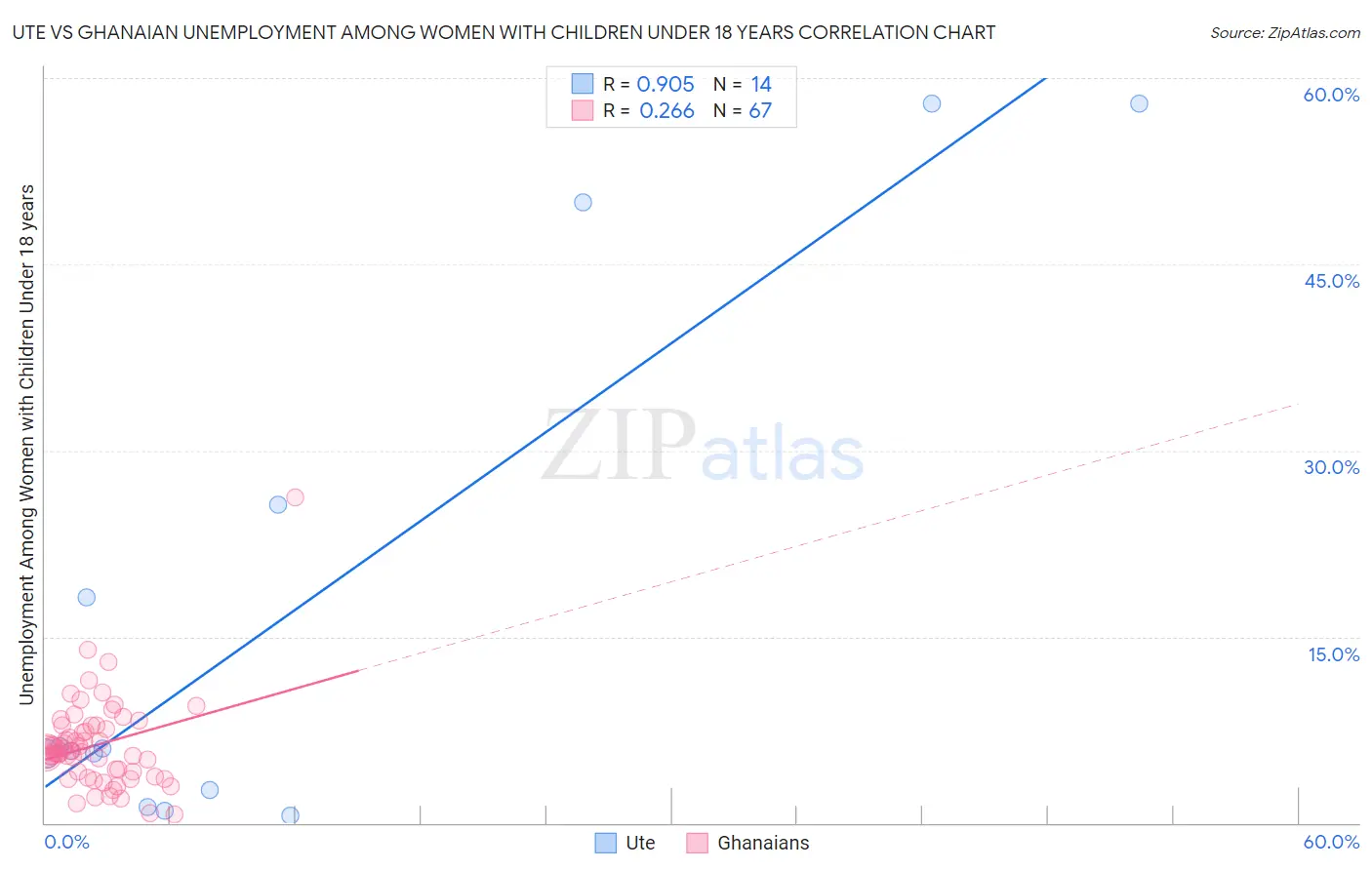Ute vs Ghanaian Unemployment Among Women with Children Under 18 years
COMPARE
Ute
Ghanaian
Unemployment Among Women with Children Under 18 years
Unemployment Among Women with Children Under 18 years Comparison
Ute
Ghanaians
5.9%
UNEMPLOYMENT AMONG WOMEN WITH CHILDREN UNDER 18 YEARS
0.7/ 100
METRIC RATING
251st/ 347
METRIC RANK
6.2%
UNEMPLOYMENT AMONG WOMEN WITH CHILDREN UNDER 18 YEARS
0.1/ 100
METRIC RATING
270th/ 347
METRIC RANK
Ute vs Ghanaian Unemployment Among Women with Children Under 18 years Correlation Chart
The statistical analysis conducted on geographies consisting of 55,040,080 people shows a near-perfect positive correlation between the proportion of Ute and unemployment rate among women with children under the age of 18 in the United States with a correlation coefficient (R) of 0.905 and weighted average of 5.9%. Similarly, the statistical analysis conducted on geographies consisting of 187,971,205 people shows a weak positive correlation between the proportion of Ghanaians and unemployment rate among women with children under the age of 18 in the United States with a correlation coefficient (R) of 0.266 and weighted average of 6.2%, a difference of 4.3%.

Unemployment Among Women with Children Under 18 years Correlation Summary
| Measurement | Ute | Ghanaian |
| Minimum | 0.60% | 0.70% |
| Maximum | 57.9% | 26.2% |
| Range | 57.3% | 25.5% |
| Mean | 17.5% | 6.3% |
| Median | 5.9% | 5.7% |
| Interquartile 25% (IQ1) | 2.7% | 4.1% |
| Interquartile 75% (IQ3) | 25.6% | 7.8% |
| Interquartile Range (IQR) | 22.9% | 3.7% |
| Standard Deviation (Sample) | 21.7% | 3.7% |
| Standard Deviation (Population) | 20.9% | 3.6% |
Demographics Similar to Ute and Ghanaians by Unemployment Among Women with Children Under 18 years
In terms of unemployment among women with children under 18 years, the demographic groups most similar to Ute are Immigrants from Cabo Verde (5.9%, a difference of 0.010%), Seminole (6.0%, a difference of 0.62%), Immigrants from Congo (6.0%, a difference of 0.84%), Immigrants from the Azores (6.0%, a difference of 1.6%), and Liberian (6.0%, a difference of 2.0%). Similarly, the demographic groups most similar to Ghanaians are Cajun (6.2%, a difference of 0.0%), Trinidadian and Tobagonian (6.2%, a difference of 0.040%), French American Indian (6.2%, a difference of 0.060%), Subsaharan African (6.2%, a difference of 0.070%), and Immigrants from Bahamas (6.1%, a difference of 0.41%).
| Demographics | Rating | Rank | Unemployment Among Women with Children Under 18 years |
| Immigrants | Cabo Verde | 0.7 /100 | #250 | Tragic 5.9% |
| Ute | 0.7 /100 | #251 | Tragic 5.9% |
| Seminole | 0.5 /100 | #252 | Tragic 6.0% |
| Immigrants | Congo | 0.4 /100 | #253 | Tragic 6.0% |
| Immigrants | Azores | 0.3 /100 | #254 | Tragic 6.0% |
| Liberians | 0.2 /100 | #255 | Tragic 6.0% |
| Nepalese | 0.2 /100 | #256 | Tragic 6.0% |
| Bermudans | 0.1 /100 | #257 | Tragic 6.1% |
| Immigrants | Nigeria | 0.1 /100 | #258 | Tragic 6.1% |
| Ottawa | 0.1 /100 | #259 | Tragic 6.1% |
| Nigerians | 0.1 /100 | #260 | Tragic 6.1% |
| Immigrants | Liberia | 0.1 /100 | #261 | Tragic 6.1% |
| Immigrants | Trinidad and Tobago | 0.1 /100 | #262 | Tragic 6.1% |
| Spanish American Indians | 0.1 /100 | #263 | Tragic 6.1% |
| Comanche | 0.1 /100 | #264 | Tragic 6.1% |
| Immigrants | Bahamas | 0.1 /100 | #265 | Tragic 6.1% |
| Sub-Saharan Africans | 0.1 /100 | #266 | Tragic 6.2% |
| French American Indians | 0.1 /100 | #267 | Tragic 6.2% |
| Trinidadians and Tobagonians | 0.1 /100 | #268 | Tragic 6.2% |
| Cajuns | 0.1 /100 | #269 | Tragic 6.2% |
| Ghanaians | 0.1 /100 | #270 | Tragic 6.2% |